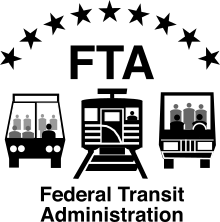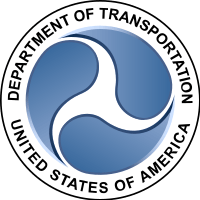Federal Transit Administration
The Federal Transit Administration (FTA) is an agency within the United States Department of Transportation (DOT) that provides financial and technical assistance to local public transportation systems. The FTA is one of ten modal administrations within the DOT. Headed by an Administrator who is appointed by the President of the United States, the FTA functions through a Washington, D.C., headquarters office and ten regional offices which assist transit agencies in all states, the District of Columbia, and the territories. Until 1991, it was known as the Urban Mass Transportation Administration (UMTA).
 | |
| Agency overview | |
|---|---|
| Formed | July 9, 1964 |
| Headquarters | Washington, D.C. |
| Agency executive |
|
| Parent agency | Department of Transportation |
| Website | http://transit.dot.gov |
Public transportation includes buses, subways, light rail, commuter rail, monorail, passenger ferry boats, trolleys, inclined railways, and people movers. The federal government, through the FTA, provides financial assistance to develop new transit systems and improve, maintain, and operate existing systems. The FTA oversees grants to state and local transit providers, primarily through its ten regional offices. These providers are responsible for managing their programs in accordance with federal requirements, and the FTA is responsible for ensuring that grantees follow federal mandates along with statutory and administrative requirements.
History
In 1962, President John F. Kennedy sent a major transportation message to the U.S. Congress. It called for the establishment of a program of federal capital assistance for mass transportation. Said President Kennedy: "To conserve and enhance values in existing urban areas is essential. But at least as important are steps to promote economic efficiency and livability in areas of future development. Our national welfare therefore requires the provision of good urban transportation, with the properly balanced use of private vehicles and modern mass transport to help shape as well as serve urban growth."
President Lyndon Johnson signed the Urban Mass Transportation Act of 1964 into law, which passed the House by a vote of 212-129 and cleared the Senate 52–41, creating the Urban Mass Transportation Administration.[1] The agency was charged with providing federal assistance for mass transit projects, including an initial $375 million in capital assistance over three years as mandated by the act. In 1991, the agency was renamed the Federal Transit Administration.[2]
Administrators
The current Acting Administrator is K. Jane Williams, having assumed the post in 2017. The last confirmed FTA Administrator, from May 2009 to January 2014, was Peter M. Rogoff.[3] Below is a list of past administrators.[4]
- Paul L. Sitton, 1966–69
- Carlos C. Villarreal, 1969–73
- Frank C. Herringer, 1973–75
- Robert E. Patricelli, 1975–77
- Richard S. Page, 1977–79
- Theodore C. Lutz, 1979–81
- Arthur E. Teele, 1981–83
- Ralph L. Stanley, 1983–87
- Alfred A. DelliBovi, 1987–89
- Brian H. Clymer, 1989–93
- Gordon J. Linton, 1993–99
- Nuria I. Fernandez (acting), 1999–2001
- Jennifer L. Dorn, 2001–2006
- James S. Simpson, 2006–2008
- Peter Rogoff, May 2009–January 2014
- Therese McMillan (acting), January 2014-March 2016
- Carolyn Flowers (acting), April 2016-January 2017
- Matt Welbes (acting), January 2017
- K. Jane Williams (acting), 2017–present
Notable programs
- Metropolitan & Statewide Planning[5]
- Urbanized Formula Funding[6]
- Clean Fuels Grant Program[7]
- Major Capital Investments[8]
- Fixed Guideway Modernization[9]
- Transportation for Elderly Persons and Persons with Disabilities[10]
- Formula Grants for Other than Urbanized Areas[11]
- Public Transportation on Indian Reservations[12]
- Rural Transit Assistance Program[13]
- Transit Cooperative Research Program[14]
- National Research & Technology Program[15]
- Job Access and Reverse Commute Program[16]
- New Freedom Program[17]
- Bus and Bus Facilities[18]
- Paul S. Sarbanes Transit in Parks Program[19]
- Alternatives Analysis[20]
- University Transportation Centers Program[21]
- Over-the-Road Bus Program[22]
- BUILD (Formerly TIGER) (USDOT)[23]
- TIGGER Program[24]
- Veterans Transportation and Community Living Initiative Capital Grants Program[25]
References
- "The Beginnings of Federal Assistance for Public Transportation". Federal Transit Administration. Retrieved November 18, 2011.
- "Urban Transportation Planning In the United States: An Historical Overview". U.S. Department of Transportation. Archived from the original on July 19, 2011. Retrieved July 9, 2011.
- "Peter M. Rogoff, Administrator". Federal Transit Administration. Retrieved November 18, 2011.
- "Heads of the Operating Administrations, U.S. Department of Transportation". Office of the Historian, U.S. DOT. March 1, 2009. Archived from the original on September 12, 2015. Retrieved January 20, 2016.
- Metropolitan & Statewide Planning (5303, 5304, 5305). Federal Transit Administration.
- Urbanized Formula Funding (5307). Federal Transit Administration.
- Clean Fuels Grant Program (5308). Federal Transit Administration.
- Major Capital Investments (New Starts & Small Starts) (5309(b)(1)). Federal Transit Administration.
- Fixed Guideway Modernization (5309 (b)(2)). Federal Transit Administration.
- Transportation for Elderly Persons and Persons with Disabilities (5310). Federal Transit Administration.
- Formula Grants for Other than Urbanized Areas (5311). Federal Transit Administration.
- Public Transportation on Indian Reservations (5311(c)). Federal Transit Administration.. Federal Transit Administration.
- Rural Transit Assistance Program (5311(b)(3)). Federal Transit Administration.
- Transit Cooperative Research Program (5313). Federal Transit Administration.
- National Research & Technology Program (5314). Federal Transit Administration.
- Job Access and Reverse Commute Program (5316). Federal Transit Administration.
- New Freedom Program (5317). Federal Transit Administration.
- Bus and Bus Facilities (5309, 5318). Federal Transit Administration.
- Paul S. Sarbanes Transit in Parks Program (5320). Federal Transit Administration.
- Alternatives Analysis (5339). Federal Transit Administration.
- University Transportation Centers Program (TEA-21 5505). Federal Transit Administration.
- Over-the-Road Bus Program. Federal Transit Administration.
- TIGER (USDOT). Federal Transit Administration.
- TIGGER Program. Federal Transit Administration.
- Veterans Transportation and Community Living Initiative Capital Grants Program. Federal Transit Administration.
